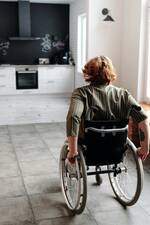
19 Dec Reeve Foundation: Results of “Living with Paralysis & Caregiver National Survey”
MedicalResearch.com Interview with:

Regina Blye
Regina Blye, Chief Program and Policy Officer
Discusses the Living with Paralysis & Caregiver National Survey
Conducted by the Christopher and Dana Reeve Foundation
MedicalResearch.com: How large is the population of Americans living with paralysis?
Response: There is a significant population of Americans living with paralysis. To note, a 2013 study by the Christopher & Dana Reeve Foundation found that 1 in 50 people in the US are living with paralysis. This is approximately 5.4 million people. I, myself, have lived with a spinal cord injury (SCI) for over 35 years. While some progress has been made over the past few decades, there is still work to be done.
In a new survey conducted by the Christopher & Dana Reeve Foundation called “Living with Paralysis & Caregiver National Survey,” we learned that a majority of Americans (69%) underestimate the prevalence of those living with paralysis in the U.S. – about two out of every 100 individuals.
Given the notable size of the population, we must work together to educate and inform families, business leaders, advocates, policymakers and the general public to help improve the quality of life for those living with, or impacted by paralysis.
The Christopher & Dana Reeve Foundation is dedicated to curing spinal cord injury by advancing innovative research and improving the quality of life for individuals and families impacted by paralysis. While we’ve been fortunate to make advancements with significant support from the community, we must all unite to accelerate comprehensive information, resources, referral services, and innovative research together.
MedicalResearch.com: How accurately did the survey participants recognize the size of population affected, as well as the burden on family members and other caregivers?
Response:
We know that Americans care and want to help.
According to the survey, one in three Americans said they know someone who is paralyzed* and most (79%) also believe that a family member providing long-term care for someone living with paralysis should receive compensation from the government.
Furthermore, with regards to compensation, women are more likely to be concerned about the need for money/income support from the government versus men; and Gen Z is twice as likely than other generations (33% versus about 15%) to believe that the government can and should financially help.
Americans who participated in this survey recognize the commitment and impact of caregiving. In fact, two-thirds of survey respondents who serve as caregivers to a family member living with a disability, and who regularly assist with daily living activities (a group comprising of 18% of all respondents) are unpaid.
*The full prompt from the survey included: living with paralysis and using a wheelchair for mobility.
MedicalResearch.com: Has the increase in firearm violence, as well as improved survival from previously fatal events, increased the number of Americans living with paralysis? Similarly, has the number of stroke survivors, who live with paralysis, also increased?
Response: Gun violence is a topic that touches me closely as a gun violence survivor that resulted in my paralysis at the age of 10 years old. As you can imagine, my life changed drastically. I grew up dreaming of being a professional basketball player. Still, I had to pivot, which led me to become a radio D.J. after college graduation, where I used my voice to elevate the person I was and give people the opportunity to see someone with a disability doing things they didn’t expect. Being a black, disabled woman using a wheelchair, I now use my story and personal experience to advocate for others.
There are over 71,000 victims of nonfatal gunshot injuries a year. Many of those wounded suffer from spinal cord injury and paralysis. A 2020 City of Philadelphia Public Health Report found that nearly 1 in 7 victims of gun violence in Philadelphia experience paralysis. We support advocacy efforts seeking better data collection to better understand the national prevalence of paralysis due to firearm violence.
The Reeve Foundation is available to help survivors of nonfatal gun injuries in any way through the National Paralysis Resource Center (NPRC). We are here to assist survivors, or their caregivers impacted by these events.
MedicalResearch.com: What role should local or federal government agencies play in caring for Americans with paralysis, either at home with caregiver support or in a supported facility?
 Response: The Reeve Foundation strongly believes that no one should be forced to choose between living at home and receiving the necessary services or remaining in poverty to continue receiving them. Therefore, we continue to work with the disability community to advocate for Home and Community-Based Services (HCBS) for Americans with paralysis. The Reeve Foundation also supports many aspects of the 2022 National Strategy to Support Family Caregivers and will advocate for implementation of key state and federal initiatives to support family caregiving.
Response: The Reeve Foundation strongly believes that no one should be forced to choose between living at home and receiving the necessary services or remaining in poverty to continue receiving them. Therefore, we continue to work with the disability community to advocate for Home and Community-Based Services (HCBS) for Americans with paralysis. The Reeve Foundation also supports many aspects of the 2022 National Strategy to Support Family Caregivers and will advocate for implementation of key state and federal initiatives to support family caregiving.
As it relates to the survey findings, we learned that many Americans (65%) believe that some form of insurance (Medicare/Medicaid), or health/disability insurance would be their main source of funds to cover the cost of day-to-day living if they were to become paralyzed.
This suggests that many are not aware of the financial realities of paralysis, including limitations of public and private insurers and disability benefits, as well as high lifetime costs of the condition.
MedicalResearch.com: What additional support, beyond what the ADA mandates, is important for Americans with paralysis, especially as it pertains to wheelchair use and travel accommodations?
We consistently hear from the community about how difficult, perilous, and inconvenient air travel is for passengers with disabilities. For several years, the Foundation has been working with a coalition of disability organizations to advocate for additional improvements to air travel and is urging Congress to include certain key proposals in the Air Carrier Access Amendments Act of 2021 (ACAAA H.R. 1696) as they consider the 2023 FAA Reauthorization.
The ACAAA would do several things to strengthen equitable access to air travel. The ACAAA would also ensure new airplanes are designed to accommodate the needs of people with disabilities by requiring airlines to meet defined accessibility standards. These standards will require safe and effective boarding and deplaning, visually accessible announcements, seating accommodations, lavatories, and better stowage options for assistive devices.
As it relates to the survey findings, we found that nearly all Americans say that they’re familiar with the ADA (96%). Of those, most (74%) believe there is a need for additional support from the U.S. government for wheelchair users beyond the ADA.
Many individuals living with paralysis also face extreme challenges with travel. When it comes to air travel, for example, 34% of adults believe that the greatest challenge for someone living with paralysis is the inability to use airplane restrooms. Imagine not being able to navigate the aisle to the restroom due to wheelchair inaccessibility.
Further, most Americans (96%) do not recognize traveling on airplanes as one of the more difficult challenges in life for those living with paralysis, despite the increased media attention of frequent, costly damages to wheelchairs, dehumanizing experiences and even death.
There is a great opportunity for us to advocate for basic rights, from policies for air and land travel, to support for paid family caregivers.
6) Is there anything else you would like to add?
Accessible Healthcare for Persons with Paralysis and Mobility Disabilities
The barriers to accessible healthcare for persons with paralysis and mobility disabilities begin with the logistical difficulties and increased expense of traveling to and from care facilities. Moreover, once an individual with disabilities arrives at the facility, they meet an entirely new set of physical barriers to accessibility, such as ramps, check in areas, treatment rooms, examination tables and weight scales, that are all too often unable to meet their unique accessibility needs. The Christopher & Dana Reeve Foundation is dedicated to removing these barriers to access and creating accommodations for all types of persons with disability to use healthcare services and facilities.
The Reeve Foundation’s mission is to improve the lives of those living with or caring for someone with paralysis. These individuals face many obstacles in their day-to-day lives and are often overlooked in crucial conversations surrounding diversity, equity, inclusion and research.
The Reeve Foundation’s NPRC also provides free, comprehensive, national sources of informational support for people living with paralysis and their caregivers. The NPRC has assisted over 120,000 individuals and families since its launch in 2002.
We encourage individuals to learn more by visiting ChristopherReeve.org.
The information on MedicalResearch.com is provided for educational purposes only, and is in no way intended to diagnose, cure, or treat any medical or other condition. Always seek the advice of your physician or other qualified health and ask your doctor any questions you may have regarding a medical condition. In addition to all other limitations and disclaimers in this agreement, service provider and its third party providers disclaim any liability or loss in connection with the content provided on this website.
Last Updated on December 19, 2022 by Marie Benz MD FAAD
